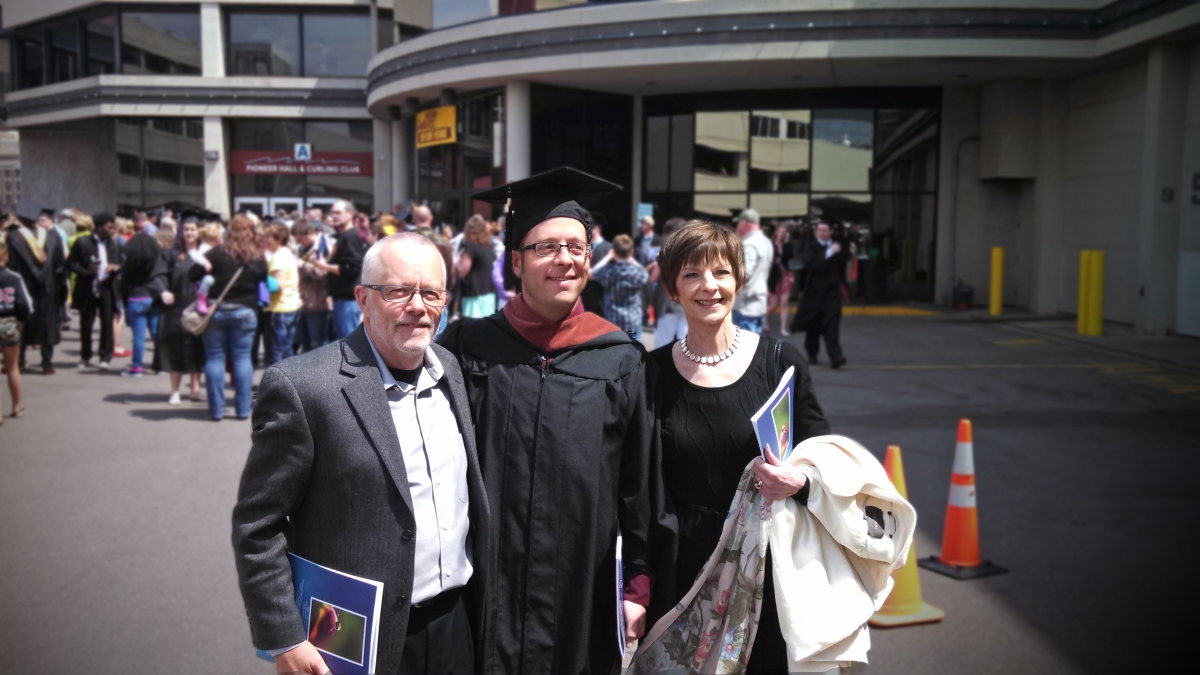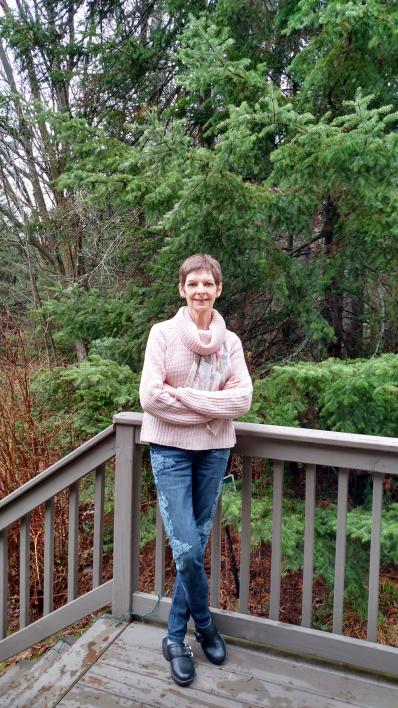Oh, the places you'll go!

ASU Online student Beth Bockes supported her husband and sons through their educations. “One day I realized it was finally my turn,” she said. Bockes graduates with her degree in English this May. Here, she and her husband celebrate their son Max's 2014 graduation with his master's degree. Photo courtesy Beth Bockes
Editor's note: This is part of a series of profiles for spring 2016 commencement. See the rest here.
When Beth Bockes takes the stage to accept her diploma this spring, it will be the culmination of a long journey with many detours.
The online English major is completing the education that she put on hold for almost 40 years. But that doesn’t mean she sat around twiddling her thumbs. Her thumbs have actually been quite busy.
Bockes is an accomplished design engineer with her family’s Antigo, Wisconsin-based company, Johnson Electric Coil.
“In the late '60s, life got in the way of my first college experience as a French major when my husband received orders for Germany during the height of the Vietnam War,” she said. “We spent the next 18 months exploring Europe on five dollars a day. Upon his discharge, my husband’s education was our priority, so I became involved in my father’s family business.
“That I had no college preparation for a career in transformer engineering was not unusual in the industry then, but a woman transformer engineer with a foundation in French definitely was!”
Even as Bockes delayed her own higher education, she continued supporting her husband and sons through theirs. “One day I realized it was finally my turn,” she said.
“When I think back on all that I pushed through on my way to this day, I realize that I'm stronger than I ever knew.”
Bockes will travel to Arizona for commencement ceremonies. While in Tempe, she’ll have an opportunity to connect with those who have made her path to her degree a bit less bumpy — including head academic adviser in English, Linda Sullivan.
“I have truly enjoyed getting to know her and visit with her beyond her role as my academic adviser,” Bockes said of Sullivan. “I think of her as my ASU friend.”
Bockes answered a few more questions about her time at ASU and her plans after graduation.
Question: What was your “aha” moment, when you realized you wanted to study the field you majored in?
Answer: As I came to understand the power and beauty of language and literature as an art of human expression, I found the corresponding art of critical reading and writing to be not only my visceral connection to all of humanity — transcending time, culture, gender, color and the like — but also a study in self-understanding, in effect, my “therapy”! Deadlines, elusive thoughts and words that just won’t come notwithstanding, I love to pursue my ideas and interpretations through writing!
Q: What’s something you learned while at ASU — in the classroom or otherwise — that surprised you, that changed your perspective?
A: One surprise was that, over time, I developed the confidence to think “I can do this,” where once I would have thought “I’ll never be able to do this!” Either way, I did it, but life was far less stressful once I realized I would get it done and even excel.
Q: Why did you choose ASU?
A: Because we live in a rural area hours from the nearest four-year campus, online education was my only practical option. Happily, I had identified two universities that offered online English programs and met my criteria: The institution had to be widely recognized as an outstanding, progressive place to learn and therefore have an excellent reputation to uphold so that, in the end, I could be truly proud of my degree. As it turned out, it was ASU CLAS English adviser Linda Sullivan — welcoming, knowledgeable, resourceful and committed to helping me make the most of my transfer credits — who made the critical difference in favor of ASU.
Q: What’s the best piece of advice you’d give to those still in school?
A: If you want to get more out of life, you have to put more into it!
Q: What was your favorite spot on campus, whether for studying, meeting friends or just thinking about life?
A: As an online student, I have no favorite campus spot, but from the safe distance of northern Wisconsin, I have to say I’ve been amused by the ongoing stream of email advisories warning of swarms of campus bees! I wouldn’t be at all amused to find myself among them, of course, but comically, that is the image that appears when I envision ASU! I do know better and look forward to visiting ASU for graduation.
Q: What are your plans after graduation?
A: I’m not sure what comes next. There are so many unexplored periods, genres, authors and works I would love to study that I’m left with the sense that I can’t stop now! But life can be inconvenient at times, and it’s currently pointing to yet another detour in my education on the road to graduate study.
Q: If someone gave you $40 million to solve one problem on our planet, what would you tackle?
A: I’m not sure how much it would take, and it will surely take more than money — specifically, global, collective will — but I would target truly universal access to meaningful and appropriate education, for its value as validation of individual self-worth and an instrument of self-empowerment, to identify and expose social injustice — oppressive, institutional, pervasive and insidious — in all its forms, wherever it may be.
The Department of English is an academic unit in ASU’s College of Liberal Arts and Sciences.
More Science and technology

ASU-led space telescope is ready to fly
The Star Planet Activity Research CubeSat, or SPARCS, a small space telescope that will monitor the flares and sunspot activity…

ASU at the heart of the state's revitalized microelectronics industry
A stronger local economy, more reliable technology, and a future where our computers and devices do the impossible: that’s the…

Breakthrough copper alloy achieves unprecedented high-temperature performance
A team of researchers from Arizona State University, the U.S. Army Research Laboratory, Lehigh University and Louisiana State…


